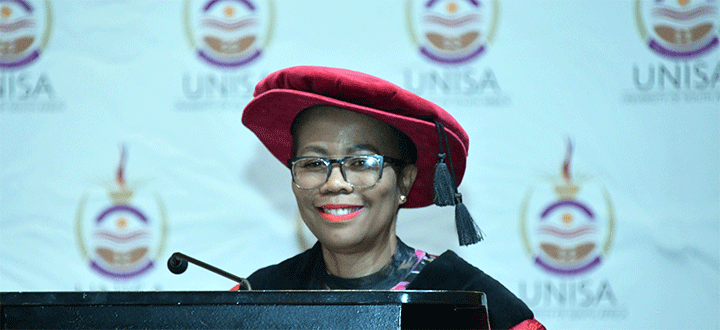College of College of Graduate Studies
The role of HE in leveraging AI: Insights from an expert panel
As artificial intelligence (AI) continues to transform industries worldwide, higher education institutions face both unprecedented opportunities and significant challenges. In a recent panel discussion at Unisa’s Catalytic Niche Area (CNA) Research Symposium, experts from diverse fields explored how AI can be strategically leveraged to enhance research, personalise learning and prepare students for a digital future.
The rapid advancement of technology is reshaping every facet of modern life, and higher education is no exception. The Fourth Industrial Revolution, marked by breakthroughs in AI and digitalisation, presents both opportunities and challenges for academic institutions.
The symposium was hosted by the Department of Research, Innovation and Commercialisation and the College of Graduate Studies, custodians of the CNA programme at Unisa.

Prof Moeketsi Letseka
The session on AI was chaired by Unisa’s Prof Moeketsi Letseka, a Distinguished Research Professor, under the theme "The role of higher education institutions in leveraging artificial intelligence in higher education".
Panel highlights
Letseka opened the session, setting the stage for a robust discussion on the transformative potential of AI in higher education. As the session chair, Letseka emphasised the need for institutions to embrace AI strategically to stay competitive and relevant in an increasingly digital world, as the country is behind in the curriculum.

From left: Krish Chetty, Senior Manager of Research at the Human Sciences Research Council (HSRC); Dr Khanyisile Twabu, Acting Deputy Director of the Academy Applied Technology and Innovation (AATI) at Unisa; and Dr Denzil Chetty, Head of the Academic Development Open Virtual Hub (ADOVH) at the University of South Africa
Krish Chetty, Senior Manager of Research at the Human Sciences Research Council (HSRC), provided a broad perspective on AI’s impact on academic research. Chetty highlighted how AI is revolutionising research methodologies by enabling more sophisticated data analysis and predictive modelling. He stressed the importance of integrating AI tools to enhance research efficiency and drive innovation across disciplines.
Dr Khanyisile Twabu, Acting Deputy Director of the Directorate: Academy Applied Technology and Innovation (AATI) at Unisa shared practical insights on AI applications within academic settings. "Let us redesign our curriculum with AI-infused designs, let us train the lecturers and teachers so that they can be able to train our students from early childhood development. It starts from being collaborative not just in higher education but also from us as human beings and us as citizens in Africa as a whole."
She also addressed the challenges of technology adoption, including the need for ongoing training and support for faculty and staff.
Dr Denzil Chetty, Head of the Academic Development Open Virtual Hub (ADOVH) at Unisa, said if the country does not have leaders who understand what the definition of the Fourth Industrial Revolution is, then it will have challenges, He further emphasised that the institution should be thinking about refining its own curriculum at colleges.
Key discussion points
AI integration in curriculum design: The panellists agreed on the potential of AI to revolutionise curriculum design by enabling more personalised and adaptive learning experiences. AI tools can help identify students' strengths and weaknesses, allowing for more targeted interventions and support.
Personalised learning experiences: The discussion highlighted the benefits of AI in creating customised learning pathways. Adaptive learning platforms can adjust content and assessments based on individual student performance, potentially improving learning outcomes and engagement.
Challenges and ethical considerations: The panel addressed several challenges associated with AI in education, including data privacy concerns and the need for ethical guidelines. Ensuring transparency and maintaining academic integrity are critical as AI technologies become more integrated into educational systems.
The panel discussion underscored the transformative potential of AI in higher education while also highlighting the need for careful planning and consideration. By embracing AI technologies, higher education institutions can enhance research capabilities, personalise learning experiences and better prepare students for the future workforce. However, it is essential to address the associated challenges and ethical concerns to ensure that AI’s benefits are realised in a responsible and equitable manner.
As we move further into the Fourth Industrial Revolution, the insights from this panel provide a valuable roadmap for institutions seeking to navigate the evolving landscape of higher education and digital innovation.
* By Rememberance Manganyi, Journalist Intern, Department of Institutional Advancement
Publish date: 2024-09-03 00:00:00.0


 President Ramaphosa appoints Unisan to the CRL Rights Commission
President Ramaphosa appoints Unisan to the CRL Rights Commission
 Unisa VC appointed for second term, looks back on the 2024 academic year
Unisa VC appointed for second term, looks back on the 2024 academic year
 From passion to profession: Sonto Mthwane's journey in tourism management
From passion to profession: Sonto Mthwane's journey in tourism management
 Uniting for open knowledge
Uniting for open knowledge
 Unisa to partner with Government to tackle water, energy and infrastructure challenges
Unisa to partner with Government to tackle water, energy and infrastructure challenges